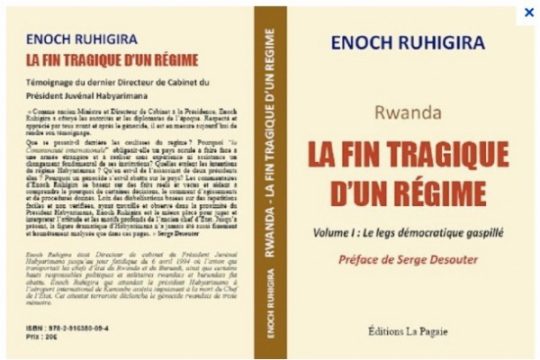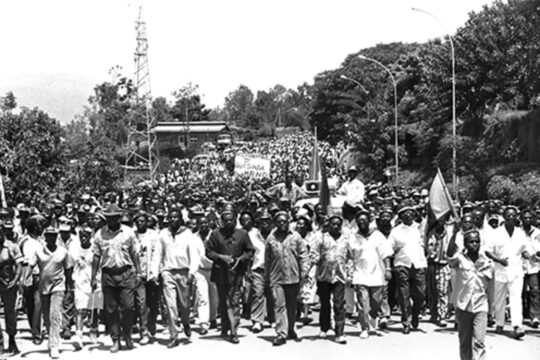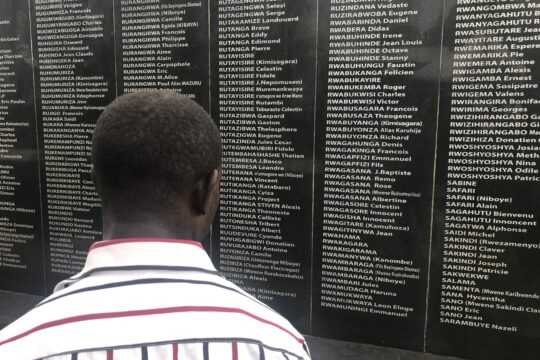JusticeInfo here publishes comments of Paris professor André Guichaoua on the July 20, 2016 arrest in Frankfurt, Germany, of Enoch Ruhigira, last head of presidential staff under Rwandan President Juvénal Habyarimana. Professor Guichaoua is a specialist on the Great Lakes region of Africa and testified several times as an expert witness for the Prosecutor at the International Criminal Tribunal for Rwanda (ICTR), which closed at the end of 2015.
This paper presents a brief factual summary of the efforts of the Prosecutor General of Rwanda to obtain during the last fifteen years the extradition of M. Enoch Ruhigira, became a New Zealand’s citizen. From New Zealand to Germany, it describes the ups and downs of judicial cooperation with Rwanda (2005-2016).
The New Zealand authorities facing the Rwandan judicial practices (2005-2014)
- On 14 December 2005, the New Zealand authorities were informed of the existence of an international arrest warrant issued on November 25, 2004 against Mr. Enoch Ruhigira. Mr. Ruhigira had previously obtained New Zealand citizenship on October 6, 2005. At the same time, arrest warrants were received for two other Rwandan nationals. The Labour Department was soon instructed to carry out “Operation Rwanda”.
- In February 2006, investigations were initiated to verify the regularity in the procedure followed to grant citizenship to Enoch Ruhigira, to document his track record and to establish if there was any link between his arrest warrant and those served against the two other Rwandan nationals, who had taken refuge in New Zealand.
- In June 2006, given the complexity and the stakes at play in these cases, two groups were created: one “strategic” and one “operational”. Both groups included various stakeholders at the administrative, political and judicial levels, and were working under the responsibility of a single coordinator who reported directly to the Prime Minister.
- Various procedures were used to collect information, including among others sending a mission to Rwanda to collect information from the judicial authorities. New Zealand named a Verification Officer responsible for making contacts with The Office of the Prosecutor General of the Republic of Rwanda and the Prosecutor who was conducting further investigations. Meanwhile, the documentary resources of the ICTR in Arusha were solicited in order to understand why a high profile person occupying such a high position in the formal hierarchy of power and who was also a public figure had not been included from the first moment in the prosecutions of The Office of the Prosecutor (now “OTP”).
- On the other hand, on the recommendation of New Zealand lawyers, acting in their capacity as expert witnesses to OTP, this writer was requested by the Refugee Research & Immigration Branch of Wellington to participate in the investigations into the cases of the three Rwandan nationals who sought asylum in New Zealand.
- Through the investigations, looking purely at factual evidence, the statements mentioned in the Red Notice appeared in many respects to be implausible.
“Summary of facts of the case: Rwanda: RUHINGIRA planned, incited and supervised the extermination of Tutsis in the province of Kibuye. On 28 April 1994, in Kibuye, RUHINGIRA organized a large meeting with the prefect of the province of Kibuye and the local leaders, with the aim of inciting and encouraging the people to exterminate the Tutsis in Kibuye province. On 30 May 1994, in Kibuye, at another meeting, which he and the prefecture leaders organized, RUHINGIRA called on people to start erecting road blocks and checkpoints to capture and exterminate Tutsis, who were trying to flee the area. On 17 June 1994, in Kibuye, during another meeting, he and the local leaders distributed pangas and machetes to the militias in order to kill Tutsis.” (Ruhingira Enoch, Fugitive wanted for prosecution, Interpol, 25 November 2004)
- The statement was implausible because Enoch Ruhigira was flown out of Rwanda by Belgian soldiers on April 12, 1994 after the closure of the Belgian Embassy and he has not returned to Rwanda since then. This was easily demonstrated during investigations carried out in 2006-07 by looking at his two passports and relevant documents indicating where he was living during that period.
- Everyone who came to know about this Red Notice were stunned and troubled by the Prosecution Authority in Rwanda putting forward as exclusive evidence the testimonies of dozens of factual witnesses stating they had seen Enoch Ruhigira at the sites of large scale massacres in Kibuye prefecture during the three months of the genocide. This was absolutely impossible because he was no longer living on the Rwandan territory.
- However, the New Zealand authorities, keen to protect their country’s good image and not wanting in any way or form to be seen as sheltering and protecting “perpetrators of genocide” extensively sought for information among countries also involved in Enoch Ruhigira’s case (such as Belgium) and extended their investigations to the years preceding the period of the genocide. At the end of their investigations, the various administrative and judicial authorities of the country did not carry out the Rwandan Prosecution Authority’s requests for proceedings.
- Then exchanges took place between the various parties who had contributed to this outcome of the investigation in order to find out whether it was wise to ask for the withdrawal of the arrest warrant and the Red Notice. The common conclusion consisted in maintaining the status quo because it appeared most likely that Rwanda would immediately send other accusations corresponding to this time around to periods when he was present in the country.
- It was only on September 22, 2015, following a request from Mr Ruhigira, relayed by the New Zealand authorities, that Interpol informed him that “the information which you referred to is no longer registered in INTERPOL's files”. He was then able to test his newfound freedom by travelling to Australia then to the Philippines and was granted an entry visa in Singapore on the day before his transit at Frankfurt airport on his way to Paris.
2016: Rwanda’s requirements anticipated by the prosecutor of Frankfurt?
- On 1 July 2016, three weeks before Mr Ruhigira’s departure for Europe, the Kigali government’s daily newspaper, The New Times, announced : “The Government ha(s) issued indictments for two of the three known Genocide fugitives in New Zealand, the National Public Prosecution Authority (NPPA) has said” (01.07.2016), but it was only in its edition of July 19, while Enoch Ruhigira was flying to Europe, that the same newspaper made public the names of the people targeted, including specifically Enoch Ruhigira.
- On his transit in Frankfurt, on July 20, 2016, it seemed likely that Enoch Ruhigira could be arrested by dozens of police officers looking for a “dangerous criminal” in transit on a Lufthansa flight. That said, this would also be strange if one takes into account the fact that Enoch Ruhigira was carrying documents that cleared him of any wrongdoing (the 2015 Interpol letter already mentioned, and New Zealand letters issued respectively by the Ministry of Commerce, Innovation and Employment on January 9, 2015 and the Ministry of Justice on December 9, 2015) and the information received in mid-July that Interpol had not registered the issuance of any new warrant of arrest.
- It was likely because the announcement on 1 July 2016 in the government press by the spokesperson of the National Prosecution Authority (NPPA) of Rwanda that the proceedings against Rwandan nationals living in New Zealand would resume, after nine years of a status quo, was not by accident. The Rwandan authorities had been informed that, for the first time since the unsuccessful issuance of the 2004 arrest warrant, Enoch Ruhigira was leaving his remote island to travel to Europe. And it was not by accident that the same spokesman had waited for the morning of July 19, when Enoch Ruhigira had taken his flight the previous day, to announce that Enoch Ruhigira was the subject of an arrest warrant which according to him had just been submitted to Interpol Kigali ... but not yet recorded on the Interpol website.
- The arrest was quite surprising as at the dates of his trip, there was no international arrest warrant on the Interpol website, neither the one issued in 2004 which was invalidated and removed, nor the one which according to an NPPA spokesperson had just been issued. The arrest was therefore organized on the basis of the 2004 Red notice, dug out on the occasion from the archives of the Federal Office of Criminal Police of Wiesbaden and justified a posteriori by a prior provisional warrant forwarded by the Prosecutor General of Rwanda. A rather unusual legal window-dressing by the Frankfurt prosecutor's office.
- As a matter of fact, the prosecutor arrested Enoch Ruhigira and started the extradition process with the Rwandan authorities even before examining the contents of the official documents in his possession. The prosecutor did not seek to know either why the Red Notice had been invalidated and withdrawn by Interpol. Nor did he seek to get information on Ruhigira’s situation vis-à-vis the judicial authorities of the country he is a citizen of or on other legal institutions that had to give a ruling on his track record. Among such institutions, the Brussels Council Chamber, after 14 years of investigations, dismissed the case altogether in its 2 June 2009 judgment.
- It is still quite surprising that twenty-two years after the genocide and after waiting ten years before deciding to prosecute Enoch Ruhigira for crimes he allegedly committed, the Prosecutor General of Rwanda, as of the 22nd of July 2016, was unable to lodge a formal charge sheet and was content with writing a line of argument comprised of 14 lines. Such unreadiness justified the Frankfurt prosecutor granting a three months’ extension.
- In addition to the 2004 serious allegations of committing genocide in his native Kibuye prefecture levelled against Enoch Ruhigira, the new arrest warrant has added planning and implementing genocide as well as taking part in the massacres that made headlines during the years of war. It reads:
“However, it is known that Mr. Enoch RUHIGIRA was not in the Country on 6th April 1994, when the President’s Plane crashed because he had remained behind in Arusha-Tanzania, but genocide in Rwanda begun from 1st October 1990 to 31st December 1994; and Enoch Ruhigira is characterized as having played a role in planning and instigating genocide, as a Minister in the President’s Office starting from 1992.
Witnesses in the file accuse him of genocide against the “BAGOGWE” Tutsi in 1992, the Killings of Tutsi in BUSEGESERA in 1992, and KIBIRIRA in Gisenyi Prefecture all killings that took place in 1992 when he was in the Country.
Witnesses in the file associate him with Col. BAGOSORA, Col. SAGATWA, Col. Anatole NSENGIYUMVA (All convicts of genocide by ICTR) and One NTIRIVAMUNDA Alphonse living in France who is also indicted and wanted for genocide.
Enoch RUHIGIRA is identified by Witnesses as a member of Escadron de la Mort (Death Squad), all these genocide activities conducted before 1994. However, they are other witnesses who confirm he was in Rwanda in 1994 during genocide.”
- From the outset, these assertions can be considered just as surprising as the 2004 Red notice since the line of argument from start to end is based on a series of factual errors and false statements.
- The first sentence begins with a statement which is a blatant untruth: Enoch Ruhigira was indeed present on the tarmac of Kigali airport on April 6 in the evening. As Chief of staff of the President, he was, in the company of the diplomatic corps, in charge of the reception of the presidential delegation when the plane crashed some distance away from the group.
- A further mistake: even if Enoch Ruhigira had accompanied President Habyarimana on his trip, he could not have been at “Arusha/Tanzania”, as the warrant states, since it was in Dar es-Salaam that regional Summit which was attended by the President were held on that day.
- The third body of the sentence then puts forward a start date of the genocide certainly uncommon with regard to all official documents such as those endorsed by the Security Council when they determined the period that falls within the mandate of the ICTR's jurisdiction. The mandate covers crimes committed in Rwanda from 1 January-31 December 1994.
- The paragraph ends with a false statement, which argues that the involvement of Enoch Ruhigira in planning and instigating the genocide corresponds to his appointment as Minister in the President’s Office “starting from 1992”. As a matter of fact, his position as “Minister in the Presidency of the Republic responsible for the Coordination of Government Action” began on February 7 1991 and ended on 30 December 1991. On 1 January 1992, he was serving as Minister of Finance.
- Then comes the list of “all killings that took place in 1992” which he allegedly planned and implemented under President Habyarimana. They are mentioned in this order “Bagogwe”, “Bugesera”, “Kibirira”, but again the dates are wrong: neither the massacres of Bagogwe nor those in Kibirira took place in 1992 – they happened from 25th January 1991 to 4th February 1991 and from 11th to 13th October 1990 respectively. Only in Bugesera did massacres take place in March 1992. However, Enoch Ruhigira was at the time Minister of Finance and negotiating the establishment of the coalition government of 16 April 1992 with the opposition.
- The allegations then mentioned the names of military officers he was allegedly associated with. Now, still strictly sticking to facts, the only military officer with whom he could indeed have close office relations with was Sagatwa Elie because their offices were near each other in the same building of the President’s Office, one on the right hand of the President’s working office and the other on the left. Moreover, it is wrong to say that this brother in law of the President was prosecuted and convicted by the ICTR (“All genocide convicts by ICTR”) because he died on April 6th, 1994 in the attack against the presidential plane.
- Again why did the Prosecution assert that Ntilivamunda Alphonse, one of the sons-in law of Juvenal Habyarimana, settled in France, while it is common knowledge that he resides in Belgium ?
- Finally, the statement at the end of the presentation of the acts of genocide that took place before 1994 (“all these genocide activities conducted before 1994”) that witnesses saw Enoch Ruhigira in Rwanda during the months of genocide, as the 2004 Red Notice wrongly maintained, is a challenge.
- By endorsing such implausible, impossible and purely complacent testimonies, such a statement endorses and institutionalizes de facto the Prosecutor General of Rwanda resorting to this inexhaustible tool. It clearly demonstrates that there is nothing impossible for those who wrote and validated the document, a mere draft note comprised of very poor sentences, devoid of orderly reasoning and without any proved argument. Between factual errors and fiction, self-importance and absence of formal rigour, the bounds of propriety have conspicuously been crossed.
- Why indeed should the Rwandan Prosecution submit to higher requirements and norms when they can get whatever they want by merely speculating on their interlocutors’ gullibility, without worrying about likelihood or fearing any reasonably informed reader raising objections.
- The Rwandan Prosecution has learnt lessons from the failure of the 2004 extradition request exactly as had been anticipated back then by the actors in the proceedings (see above part One, last paragraph but one). Hence the new arrest warrant will cover no less unheard of accusations but ones to do with facts that took place before Enoch Ruhigira left Rwanda, as appears in the provisional arrest warrant: “all these genocide activities conducted before 1994 […] when he was in the Country”.
Which judicial cooperation with a country which organizes “politically motivated trials, the prosecution of political opponents and the prejudging of the outcome of the trial”[1]?
- Under these conditions, how can a detainee under strict surveillance, without any outside contact apart from his lawyer, without any other means of communication, prepare his defence against general and ever changing accusations whose exact contents he will get acquainted with only at the end of the legal process, after his fate is presumably sealed?
- But more fundamentally, how can a person kept in the dark who is presumed guilty expect to get a fair trial when the legal obligations of “judicial cooperation” makes it an obligation for the Prosecution of Frankfurt to communicate expeditiously to the Rwandan prosecution all the defence’s elements and arguments, so that it has full opportunity to rectify its position, circumvent any refutation, and concoct fresh charges during the three months granted them.
André Guichaoua, Professor
The University of Paris 1 Panthéon-Sorbonne
Expert witness for the Office of the Prosecutor of the International Criminal Tribunal for Rwanda and other national jurisdictions for trial
A version in German is also available on the site afrique-des-grands-lacs.univ-paris1.fr
[1] European Parliament resolution of 6 October 2016 on Rwanda, the Case of Victoire Ingabire (2016/2910 (RSP)), p. 1, p. 4.





